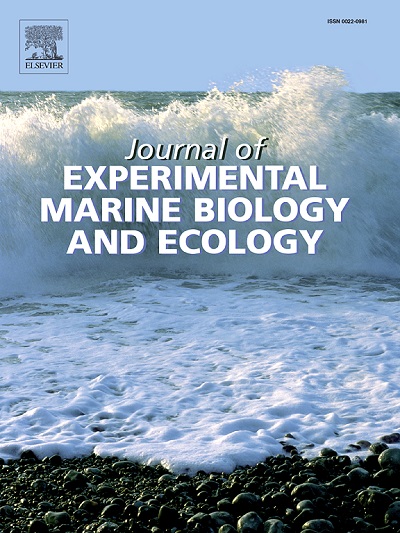光共生植物三叶卷叶对热胁迫敏感
IF 1.8
3区 生物学
Q3 ECOLOGY
Journal of Experimental Marine Biology and Ecology
Pub Date : 2025-01-01
DOI:10.1016/j.jembe.2024.152079
引用次数: 0
摘要
多种海洋无脊椎动物物种已被用作研究气候变化和白化对动物-藻类共生影响的模式生物。然而,一种潜在的模式宿主尚未被解决,它是与绿藻相关的acel convolutroba retrogemma。因此,本研究评估了热胁迫是否会降低逆草的存活率、大小、共生体密度和叶绿素-a浓度。受试者接受了一项实验,以检查温度(26、28和30°C)和暴露(1、2和4周)对这四个变量中的每一个的综合影响。监测种群大小和总长度,然后取样和浸渍,定量共生体和提取叶绿素-a,用荧光仪测量。结果表明,在28°C和30°C条件下,4周后种群数量分别下降50%和100%。长度在不同条件下没有差异。在30°C下,随着共生体密度的降低,珊瑚发生了漂白,叶绿素-a含量在28°C和30°C下均有所下降。在当前气候变化的背景下,与其他模式生物相比,逆转录C.与Tetraselmis sp.之间的联系似乎相当脆弱。随着预计的海洋热浪的增加,这种全息生物可能会受到严重威胁。本文章由计算机程序翻译,如有差异,请以英文原文为准。
The photosymbiotic acoel Convolutriloba retrogemma (Xenacoelomorpha) is sensitive to thermal stress
Multiple marine invertebrate species have been utilized as model organisms for investigations on the effects of climate change and bleaching on animal-algal symbioses. However, one potential model host that has not been addressed is the acoel Convolutriloba retrogemma, which associates with chlorophytes. Therefore, this study assessed whether thermal stress reduces survival, size, symbiont density and chlorophyll-a concentration for C. retrogemma. Acoels were subjected to an experiment to examine the combined effects of temperature (26, 28 and 30 °C) and exposure (1, 2 and 4 weeks) on each of the four variables. The population size and total length of acoels were monitored, followed by sampling and maceration for quantifying symbionts and extracting chlorophyll-a, which was measured using a fluorometer. Results showed significant acoel mortality at both 28 and 30 °C, with populations decreasing by 50 % and 100 %, respectively, after four weeks. Length did not differ among conditions. Acoels underwent bleaching as symbiont density decreased at 30 °C, and chlorophyll-a content decreased at both 28 and 30 °C. In the current context of climate change, the association between C. retrogemma and Tetraselmis sp. appears to be considerably fragile compared to other model organisms. With the predicted increase in marine heatwaves, this holobiont may be severely threatened.
求助全文
通过发布文献求助,成功后即可免费获取论文全文。
去求助
来源期刊
CiteScore
4.30
自引率
0.00%
发文量
98
审稿时长
14 weeks
期刊介绍:
The Journal of Experimental Marine Biology and Ecology provides a forum for experimental ecological research on marine organisms in relation to their environment. Topic areas include studies that focus on biochemistry, physiology, behavior, genetics, and ecological theory. The main emphasis of the Journal lies in hypothesis driven experimental work, both from the laboratory and the field. Natural experiments or descriptive studies that elucidate fundamental ecological processes are welcome. Submissions should have a broad ecological framework beyond the specific study organism or geographic region.
Short communications that highlight emerging issues and exciting discoveries within five printed pages will receive a rapid turnaround. Papers describing important new analytical, computational, experimental and theoretical techniques and methods are encouraged and will be highlighted as Methodological Advances. We welcome proposals for Review Papers synthesizing a specific field within marine ecology. Finally, the journal aims to publish Special Issues at regular intervals synthesizing a particular field of marine science. All printed papers undergo a peer review process before being accepted and will receive a first decision within three months.

 求助内容:
求助内容: 应助结果提醒方式:
应助结果提醒方式:


